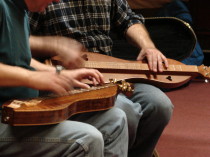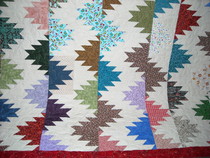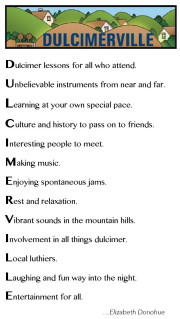
You can contact us here:
FROM A DULCIMERVILLE PARTICIPANT: "A great inexpensive vacation, and the bonus was I brought home the ability to enjoy music much more!"
SHARE A RIDE? If you are willing to share a ride (and expenses) to Dulcimerville or from area airports, some very nice dulcimer folks need a little help that way. Just email Lois Hornbostel if you can help.
Elective Classes:
Register now and save your spot in DULCIMERVILLE!
After the morning courses, these afternoon/evening classes make it possible for you to “personalize” your learning experience. They focus specifically on musical and playing styles, or give special coaching sessions for our students registered in the less-experienced skill levels. Electives (2 hours) & the Basic Fingerpicking mini-course (4 hours) will be taught on Tuesday, Wednesday and Friday afternoons and Thursday evening. You pre-register for them on your Participant Registration Form when you sign up for your morning course. Descriptions of each of these electives/mini-courses are below.
A note on the playing skill levels of these Electives: We want you to find classes that fit your skills and goals. You’ll notice after the title & teacher of each class that skill levels are designated, and sometimes including more than one level:
•All Skill Levels
•Beginners
•Advanced Beginners
•Intermediate levels
•Intermediate-into-Advanced and Advanced
This is never an exact science, but the instructor will prepare the ease or challenge of each class to suit the skill level(s) noted. (Skill levels are defined in the 13-1/4 hr. morning course descriptions.) When you choose your classes, please consider the skill level(s) they address. Instructors have indicated that some classes will be appropriate for more than one skill level.
You’ll notice we are providing the choice of afternoon “coaching” sessions for students in our Beginner, Advanced Beginner and Early Intermediate morning courses. If that’s you, you are free to choose either the coaching sessions that go with your morning class or choose other Electives instead if you feel you are ready.
Suppose you’d just love to take that class of easy songs intended for players below your current skill level?
You are welcome to sign up. We ask that you understand that the class may not challenge you completely and the instructor needs to keep the class at a more basic, slower pace to address the majority of students. You can learn satisfying new music that you can later accelerate or ornament according to your personal skill level.
Suppose you'd just love to take that chording class that's mainly for players above your current skill level?
You are welcome to sign up. We ask that you expect it to be challenging because the instructor is teaching a class intended for the more experienced players. You can still take the challenge and learn a lot. Save the basic questions until class is over and the instructor will no doubt be happy to answer them. Another option for the class we're talking about would be to practice chords before you arrive so you will be right up with the rest of that class!
Your Choices:
Tuesday, June 4, 2013, 2-4 p.m. (Day One of Electives)
Today's electives have: 1 choice especially for Beginners, 4 choices for Advanced Beginners, 4 choices for Early Intermediates, 3 choices for Progressing Intermediates, 5 choices for Int.-into-Adv., and 4 choices for Advanced players.
T1. BEGINNER / ADVANCED BEGINNER SKILLS COACHING, with Heidi & John Cerrigione. Only for participants taking the morning Beginner Course. This class will provide a review of your morning's material, individual help, and suggestions on what to practice on your own. We encourage all Beginner/Advanced Beginner course participants to take at least today's afternoon coaching session. These Beginner/Advanced coaching classes will also be offered tomorrow and Thursday. If you decide to choose other electives we recommend you take note of their difficulty levels.
T2. EARLY INTERMEDIATE SKILLS COACHING, with Bing Futch. Only for participants taking the morning Early Intermediate Course. This class will provide a review of the morning's material, individual help, and suggestions on what to practice on your own. (After today all Early Intermediate course participants choose from regular electives, particularly those that specify Intermediate skill level. If you feel you'll be ready for electives today, this coaching class is not mandatory.)
T3. SACRED SONGS, with Don Pedi. Advanced Beginners & up. Starting tuning DAD. Don will teach a variety of pieces learned directly by ear from authentic sources or from field recordings. The songs are mostly arranged in the old-time style of playing the melody while singing. Songs to include Oil in My Vessel, Some Have Fathers Gone to Glory, Deliverance Will Come, Prodigal Son, The Prettiest Thing I Ever Done, and more.
T4. FOUR OR MORE GREAT EASY JAM TUNES, with Paul Andry. For Advanced Beginner & Intermediate players. DAD tuning. Join the jams after learning several of the easier songs typically played in mountain dulcimer jams all over the country.
T5. "READING" HANDS, with Stephen Seifert. Advanced Beginners & up. DAD tuning. Steve will show you exactly how to learn to play by watching others. We'll start with really simple tunes, going very slowly, and work towards learning harder tunes at faster tempos. Using this along with sheet music can lead to seriously inspiring growth as a musician.
T6. SINGING WITH THE MOUNTAIN DULCIMER, with Sarah Morgan. Intermediate levels. DAD tuning, and bring a capo. The subtle and unpretentious sound of the mountain dulcimer makes it a perfect instrument for accompanying the voice. We will cover the musical knowledge and techniques needed when arranging a vocal backup. We will cover how choose the right key for your voice, as well as arranging a harmony part to accompany yourself. A selection of vocals will be taught from a variety of genres.
T7. NEW WAYS TO PLAY WITH A NOTER, with Randy Adams. Intermediate-into-Advanced thru Advanced. DAD tuning. Bring a noter. Randy is known for his innovative use of the noter stick. Unlike traditional noter playing (in which notes are played only on the first string), Randy uses the noter to play notes on all the dulcimer's strings and to get fascinating slides, hammer-ons, pull-offs and delicious syncopations. He will teach this style, along with some old-time music using it.
T8. PLAYING IN 8 KEYS WITHOUT RE-TUNING, with Ehukai Teves. For Intermediate-into-Advanced and Advanced players. DAD tuning. Ehukai has devised a system of chording he calls "Home-Middle-Outside," which enables a player in DAD on a (diatonic) dulcimer to play chords and basic melodies in the keys of D, E, G, A, B, C, and with simple adaptations F# and C#. This can save you well in a jam session with other instruments playing in a lot more than the key of D, can help you find more keys to fit your vocal range, and makes it easy for you to play without looking at your hands. ALL without re-tuning from DAD!
Wednesday, June 5, 2-4 p.m. (Day Two of Electives)
Today's electives have: 2 choices for Beginners, 4 choices for Advanced Beginners, 5 choices for Early Intermediates, 5 choices for Progressing Intermediates, 6 choices for Int.-into-Adv., and 6 choices for Advanced players.
W1. BEGINNER / ADVANCED BEGINNER SKILLS COACHING, with Heidi & John Cerrigione. Only for participants taking the morning Beginner/Advanced Beginner Course. This class will provide a review of your morning's material, individual help, and suggestions on what to practice on your own. These Beginner coaching classes will also be offered tomorrow. If you decide to choose other electives we recommend you take note of their difficulty levels.
W2. DULCIMER MAINTENANCE, with "Dulcimer Doctor" Joseph Shelton. Any skill level. Bring your dulcimer along and learn how to keep it healthy and performing at its best. Joseph will teach how to determine string gauges for your dulcimer, to change strings, and how to recognize if adjustments or repairs are needed. He suggests you first read his article on "Understanding Dulcimer Maintenance" in the August '05 Back Issue (http://archive.dulcimersessions.com/aug05/understanding.html) of Mel Bay's DulcimerSessions webzine. This will allow more time for additional maintenance information and discussions in class.
W3. 4-HR. MINI-COURSE: BASIC FINGERPICKING with Linda Brockinton, Part 1. For Advanced Beginner players and higher level players who are new to fingerpicking. DAD tuning. To take this class, you sign up for and attend its two sessions today and tomorrow (Thurs.). Back by popular demand for those who love the "softer side of the dulcimer"! This class will cover techniques for left and right hand work, timing, picking patterns, chord shapes, and converting your favorite strummed music to this style. Fingerpicking is very good for those having trouble with counting time. This year the mini-course will also teach how to work out simple picking chord patterns for those who like to sing with their dulcimers.
W4. OUT-OF-THE-ORDINARY WALTZES, with Neal Walters. For Advanced Beginner & Intermediate players. DAD tuning. Waltzes are wonderful on the mountain dulcimer. Neal has a large number of obscure, beautiful and, often, unusual waltzes that he's arranged for the instrument over the years. He'll teach several of his favorites.
W5. CHARMING EUROPEAN FOLK MUSIC FROM THE DULCIMER'S (AND MAYBE YOUR) EUROPEAN ROOTS! with Lois Hornbostel. Intermediate & up. Starting tuning DAD. Bring a capo. The Southern Appalachian Mountain Dulcimer evolved from zithers brought to our shores by Northern European immigrants. These older zithers are part of a family that includes the hummel, German scheitholt, Norwegian langeleik and French épinette des Vosges. We'll time-travel back into the music and lands of the dulcimer's ancestors, playing some lovely folk songs that bring out the older flavor of its voice!
W6. DISCOVERING YOUR DULCIMER IDENTITY - Finding the Music that Inspires You, with Jessica Comeau. Intermediate thru Advanced players. DAD tuning. Jessica, one of the country's finest young dulcimer players, has taken her dulcimer playing to many different repertoires, and she offers the following in this class: We will explore several tunings and keys; bring capo. This class invites participants to identify the kind of music that energizes, refreshes, inspires, or comforts them and to learn how the dulcimer can be a vehicle for this music. In this quest, we will acknowledge that while the dulcimer, as a folk instrument, is most comfortable with music from the Appalachians, British Isles, and Ireland, it also can adapt to many other styles that might speak to your soul. We will explore different keys and tunings that might awaken the creative spark as well as conduct a survey of different musical genres that others have embraced using the dulcimer (including medieval, bluegrass, Appalachian modal tunings, and world music). With the assistance of a perspective deeply devoted to inspiration and creativity, we can begin (or enrich) the journey to shaping our styles as musical artists and dulcimer players.
W7. INTROS, FILLS & OUTROS, with Ehukai Teves. Intermediate-into-Advanced thru Advanced. DAD tuning. Have you ever wished you could add special touches to the pieces you play? One stylish way to do this is to add musical "introductions" to prepare the listener's ear for the piece to come. Another is to "fill" in complementary notes when you have a long tied note (waltzes often have these). And at the end of a piece you can polish it off with an "outro" (fiddlers call these 'tags'). Ehukai will give musical examples of these enhancements, will explain how they are built, and will give you suggestions on pieces you want to spruce up!
W8. PLAYING MUSIC FOR WEDDINGS, with Sarah Morgan. Advanced players. Starting tuning DAD. Bring a tuner, as some retuning will be required. In this class, I will be teaching several unique, performance-ready pieces appropriate to play at weddings, including classical, Irish and hymn selections. We will also be covering the logistics of playing at a wedding: what to expect, problems to prepare for, what you should charge, etc. (Pssst ... for those of you who do not plan on playing at weddings anytime soon, these pieces are still some beautiful arrangements to add to your repertoire!)
Thursday, June 6, 7:30-9:30 p.m. (Day Three of Electives)
Today's electives have: 2 choices for Beginners, 3 choices for Advanced Beginners, 7 choices for Early Intermediates, 6 choices for Progressing Intermediates, 6 choices for Int.-into-Adv., and 4 choices for Advanced players.
H1. BEGINNER / ADVANCED BEGINNER SKILLS COACHING, with Heidi Cerrigione. Only for participants taking the morning Beginner/Advanced Beginner Course. This class will provide a review of your morning's material, individual help, and suggestions on what to practice on your own. Tomorrow (Fri.) you will officially be "Advanced Beginners" and there will be electives suitable for the skills you have built this week.
H2. WORKING WITH CHILDREN, with Mike Anderson. All skill levels. DAD tuning, THE FUTURE: yep, kids. An exploration, conversation, opinion sharing, expertise sharing, and general whatever on methods for teaching kids, organizing a group, keeping them interested, and anything else you want to discuss in the world of kids and dulcimers.
H3. 4-HR. MINI-COURSE: BASIC FINGERPICKING with Linda Brockinton, Part 2. For Advanced Beginner players and higher level players who are new to fingerpicking. To take this mini-course, you sign up for and attend its two sessions on Wed. (yesterday), and today. (See description under W3 in Wednesday's listing.)
H4. JUST BASIC CHORDS, with Neal Walters. Advanced Beginners thru Intermediate. DAD tuning. Neal will show you some very basic chords you can play on your mountain dulcimer to accompany singing or other instruments. A simple helping of chord theory will be included. This will also strengthen your ability to understand future classes delving deeper into chords.
H5. CHRISTMAS SONGS, with Paul Andry. Intermediate. DAD tuning. Some of the most recognized and popular songs are those played during the holiday season. This class will cover arrangements of familiar Christmas songs using several playing techniques including strumming, draw/plucking and finger picking.
H6. MOUNTAIN DULCIMER BLUES, with Bing Futch. Intermediate. DAD tuning. I got those mountain dulcimer blues...Woke up this mornin', all my dulcimer played was the blues...Woke up this mornin', all my dulcimer played was the blues! Bing will give you chords, scales, licks and rhythms for playing the blues, you'll want to use!
H7. TRADITIONAL FIDDLE TUNES, with Don Pedi. Intermediate & up. Starting tuning DAD. Popular and archaic fiddle tunes for dulcimer. Including, Old Aunt Jenny With Her Night Cap On, Big Liza Jane, The Old Folks Played and the Young People Danced, Down the Road, Walking in the Parlor, Bear Creek Hop, Snow Deer and more.
H8. PLAYING MOUNTAIN DULCIMER WITH OTHER INSTRUMENTS, with Ehukai Teves & guests John Cerrigione (guitar), and Coleen Walters (bass), Joseph Shelton (fiddle), and Randy Adams (banjo). Intermediate thru Advanced. DAD tuning. Learn the following and try them with us on your dulcimer:
. Finding what key chromatic instruments are playing in.
. Re-tuning to be able to play in keys other instruments commonly use.
. Playing in time and recognizing different rhythms.
. Playing back-up in DAD tuning in different keys.
. Reading chords from watching the hands of guitar, banjo or bass players.
. Volume considerations and how to deal with them.
. When to play louder or softer.
. Determining harmonies and varying chord inversions to add to the over-all sound.
Friday, June 7, 2:00-4:00 p.m. (Day Four - final day - of Electives)
Beginner students: You are now officially "Advanced Beginners"! For today, we recommend you choose from electives for "Advanced Beginner & up" or "All Skill Levels," if you have not already done so. If you're itchin' for challenge, you are welcome to experience a higher level class.
Today's electives have: 2 choices for Advanced Beginners (including our 'graduated' Beginners), choices for Advanced Beginners, 8 choices for Early Intermediates, 8 choices for Progressing Intermediates, 8 choices for Int.-into-Adv., and 8 choices for Advanced players.
F1. MEMORIZING YOUR MUSIC, with Paul Andry. All Skill Levels. DAD tuning. Memorizing your music frees you from the difficult task of reading while playing, thereby allowing you to concentrate on playing from the heart, focusing on playing style and actually listening to the songs while you are playing. Memorizing can help you become a "musical athlete." This workshop will explore basic memorization theory and technique, with focus on "mastering the mechanics" plus methods, tricks and exercises to learn to play confidently without tablature.
F2. SIMPLY HYMNS, with Sarah Morgan. Advanced Beginners & up. DAD tuning. This technique and repertoire class will utilize well-known hymns and religious music to inspire your dulcimer journey! There will be an emphasis on timing, rhythm and ear-training.
F3. THE MAGNIFICENT CAPO, with Lois Hornbostel. Advanced Beginners & up. DAD tuning and don't forget your capo (If you don't have one they'll be sold in our Marketplace). One of the most effective ways of playing in different keys is to simply use a capo on your mountain dulcimer. This easy tool helps you play along with other instruments and helps you find note ranges to suit your voice. You can use most all of the same fingerings you use in open DAD or other open tunings. And it makes playing easier on your fingers. We'll explore using our capo at different places up the dulcimer's fretboard, and learn how to change keys on several basic melodies you probably know.
F4. BALLADS, with Don Pedi. Advanced Beginner players & up. DAD, DGD and DAC tunings. Don will teach some versions of old "love songs" dating back for generations. Including, Tom Dooley, A Soldier Traveling From the North, The Pretty Crowing Chicken, Omie Wise, Little Margaret and more.
F5. ENSEMBLE PLAYING, with Heidi & John Cerrigione. Advanced Beginners & up. DAD tuning. A selection of melodies written for multiple parts, including Jamaica Farewell, Aloha Oe, and Bless This House.
F6. SCOTTISH SONGS & AIRS, with Jessica Comeau. For Advanced Beginner players & up. DAD; bring capo. In this class we will survey the rich variety of traditional music that originated in Scotland. For our musical repertoire, we will emphasize music that emerged within the vocal and lyrical traditions of Scottish music, including puirt a beul, waulking songs, and the music of Robert Burns. We will also examine some of the faster styles of instrumental music from Scotland for the fiddle and bagpipe (although you will not necessarily have to play them!). The tunes we will be playing include Skye Boat Song, O Gin I Were a Baron's Heir, and Dheanainn Sugradh.
F7. IMPROVISING FROM THE HEART, with Stephen Seifert. Intermediate through Advanced. DAD tuning. Steve says, "A lot of people want to be able to make stuff up but they're convinced they can't. I'm going to use a number of super easy exercises to prove you CAN do it. I'll then show you how you can use these methods to vary up tunes you already play.
F8. ROCKIN' & ROLLIN' WITH THE MOUNTAIN DULCIMER, with Bing Futch. Intermediate thru Advanced. DAD tuning. Are you ready to ROCK?! After this workshop, you will be! Learn the basics behind one of the most popular forms of music on the planet, starting with the power chord. That's right! The power chord is the key to freeing your dulcimer from the confines of a diatonic fretboard. Once we explore a variety of familiar chord progressions, we'll learn how to get in the groove with a solid right-hand rhythm, use a combination of palm mutes, accents and finger lifts to shake things up, explore extended chords for added color, learn about playing in different keys and stage-dive right into the secrets of successful solos. Besides working through some old-school rock 'n' roll and some new-school rock, we'll even let you plug into an amplifier and stomp box as we talk tone, effects and how to wake the neighbors.









